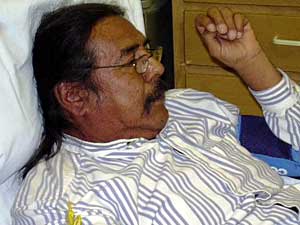|
Audio
Photos
More from MPR
Resources
Your Voice
|
'Scared straight' about diabetes
November 25, 2003
 |
| Philip Keir is on dialysis four days a week because of complications from diabetes. (MPR Photo/Dan Gunderson) |
Detroit Lakes, Minn. — Philip Keir, 57, spends a lot of time at St. Mary's Hospital in Detroit Lakes. Three days a week he arrives early in the morning, and spends four hours on a kidney dialysis machine.
"I more or less lived off of fast food, and out of the can, so to speak," says Keir. "I think all the salts in the canned goods led to my kidneys failing in the end."
Keir was diagnosed with diabetes at age 40. At 57 he's nearly blind and his kidneys have failed. He says doctors warned him to exercise and eat a healthy diet. But he never understood diabetes could destroy his body. He always thought a pill or a shot would keep him healthy.
 | |||
"I was warned about that for years and never paid no attention. Had I known about this (dialysis), that this would happen, I would have changed things a whole lot," says Keir.
Philip Keir says he doesn't want others to make the same mistake. So he's taking part in a diabetes prevention program. On a recent day, six teenagers from the White Earth Reservation crowd around his dialysis machine with solemn faces, and strain to hear what he has to say.
"You gotta start living right, exercising, watch what you eat. (If it) wasn't for this machine here, I wouldn't live too long," Keir tells the teens.
The scene is too much for two kids, who leave quickly, ashen-faced. Carol Guinn thinks that's a good sign.
"It hit them to the point where two of them got sick. It means it did hit them, it did impact them, to where they are already talking about making changes," says Guinn.
Carol Guinn works for the Anishinaabe Cultural Center in Detroit Lakes. She helped develop the Defeat Diabetes project. This project is funded by an $85,000 grant from the Minnesota Health Department's Eliminating Health Disparities Initiative. That grant support has recently been extended for another two years, providing the program with another $185,000.
|
It hit them to the point where two of them got sick. It means it did hit them, it did impact them to where they are already talking about making changes.
- Carol Guinn |
Carol Guinn says a face-to-face message is more effective than just telling kids to exercise and eat healthy food. The visit to the dialysis unit was videotaped. It will be part of a program organizers plan to bring to area schools starting next year.
As the six teenagers gather in a hospital waiting room, stories start to flow. Stories about grandmothers, dads, aunts and uncles. Nearly all the kids have lost a family member to diabetes.
"What I saw today made me feel I have to take care of myself, and do good things for myself and my people, so we don't have to go through this anymore," says Lera.
"I still eat fatty food now and then. I try to take care of myself by dancing, going in to sports in school, walking all the time or riding bike," says Bryce. "Diabetes took too many people away from me."
But these kids realize beating diabetes will not be easy. Joseph has watched adults in his life struggle to change in the face of a life-threatening disease.
"My uncle Dave stopped drinking when he found out about diabetes. Stopped drinking, stopped smoking. My uncle Dave's trying to watch himself. My auntie Jodie is different. She doesn't. (I) try to tell her to stop but she don't."
Dialysis patient Philip Keir says if even one young person embraces a healthy lifestyle, his suffering will be worthwhile.
|
News Headlines
|
Related Subjects
|
